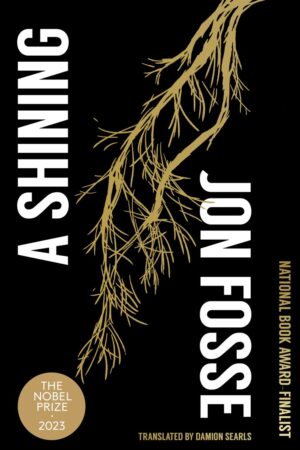A Shining
by Jon Fosse, translated by Damion Searls
reviewed by Leo Lasdun
Jon Fosse, the 2023 Nobel Laureate best known for his Septology, a 667-page book with no periods in it, has released a new novella, A Shining, 74 pages (and huge font), this time with no question marks. A Shining is made up of short simple phrases, plain iterative fragments of thought, much like those that comprise the incantatory Septology, another book of Fosse’s that was deftly and accessibly translated by Damion Searls. But where Septology is expansive in its conjurations, an immersive facsimile of an aging man’s aging consciousness, A Shining is an anemic vignette, paltry and narrow by comparison. If Septology is sublime metaphysical hypnosis, A Shining is a shot of Novocain at the dentist’s office.
The “shining” of the book’s title refers to a being, or a “presence” the narrator encounters while lost in the woods. He has driven down a country road until his car can go no farther, before ill-advisedly striking out into the forest on foot as a light snow begins to fall. A Shining isn’t the sort of book (and Fosse is not the sort of writer) that’s interested in logical whys, and so what exactly we’re doing in the woods remains mostly unclear. “It was totally wrong even to call it a thought, it was more like an impulse, a sudden idea, something like that,” the narrator says of his expedition. We’re whisked quickly into a moment resulting from choices already made, cars already started, turns already taken.
Once he encounters the presence, “a white outline there in the dark,” and reconciles himself rather quickly to the existence of the supernatural, there’s little left to say. He putzes around some more, runs into the ghosts of his parents (also out for a woodland romp), and, mostly, thinks about what the presence could be. His theories are … complicated:
… maybe it was an angel of God. Because that presence was so shining, so white, or maybe it was an evil angel. Because evil angels are angels of light too, maybe all angels radiate white, both the good ones and the evil ones. Or maybe all angels are both good and evil, it certainly might be like that too.
Asle, the brighter and more thoughtful narrator of Septology, searches instead for the hidden meanings of God, for a personal-poetic, almost Kabbalistic knowledge of the all-powerful. “[The] more God conceals himself the more he shows himself … God reveals himself by hiding,” Asle muses.
Fosse has an abiding interest in death—not only as an abstract concept, but also as a physical experience. He’s curious about how it feels to die, what it’s like. Both Septology and A Shining end with first-person accounts of their narrator’s transitions. In Septology, death is an explosion of language. The narration crescendos into a distilled chorus of Asle’s memory, an associative maelstrom of his most meaning-laden thoughts and words. This linguistic experience of death jibes with Asle’s worldview; he often couches his understanding of the divine in terms of locution: “God’s language speaks silently from everything that exists, and this silence was first broken when The Word came into the world.” Asle’s final descent into a realm of pure Word is his long-awaited union with God.
There’s no such consistency in A Shining. Matters like light and dark, life and death, suggestively fluid in Septology, become formless and murky in A Shining. Even space itself, the physics of the forest, is subject to Fosse’s abstracting eye. Upon encountering his parents, our narrator observes that, as he walks toward them and they toward him, the distance between them doesn’t seem to change. His verdict? “Impossible to understand.” The dimensionless image (and Fosse’s lack of interest in explaining it) surely serves some purpose, but it, and many others like it in A Shining, are wrapped in such intentional mystification, obfuscated by such heavy-handed riddling, that the resulting impression is one of laziness on Fosse’s part.
Much of A Shining is imbued with a faux specialness. There are changes in tense, constant narrative contradictions, and—despite Fosse’s use of a catechism-style stream-of-consciousness—an absence of question marks. Why? In Septology, the continuous sentence makes sense—it feels representative of life’s linear pathway, and the brief segment of Asle’s, which we experience with him. But A Shining’s structural gimmicks are harder to understand, and, along with the novel’s obscure narrative, feel like the distracted noodling of a profoundly gifted but very bored musician.
Published on February 14, 2024

